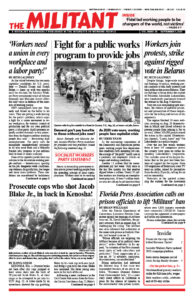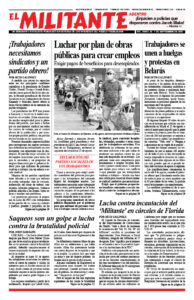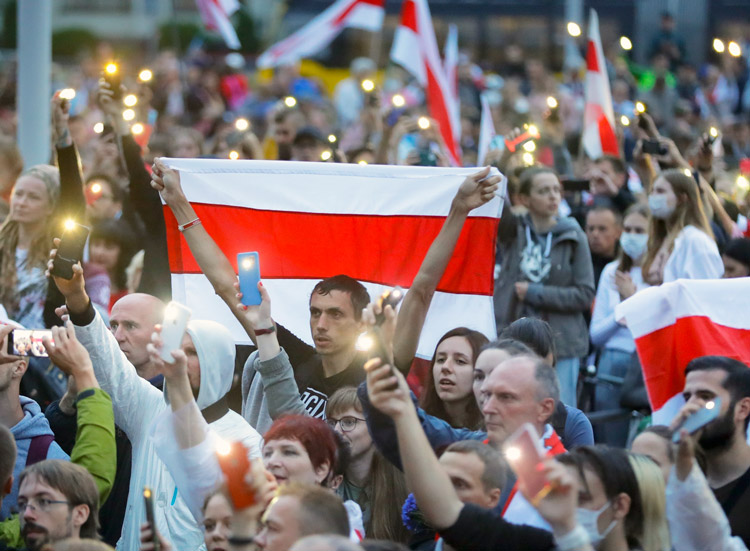Despite firings, large-scale arrests and beatings by police, working people continue to join daily protests and take strike action across Belarus. They are fighting to bring down the regime of President Alexander Lukashenko, who fraudulently proclaimed himself the winner in the Aug. 9 elections.
They are also demanding new elections, the release of political prisoners and prosecution of those responsible for the killing and torture of his opponents.
The regime blocked 50 news websites covering an Aug. 23 demonstration in Minsk and closed subways to prevent people from joining it, but to no avail. About 200,000 people joined the action in the capital. Demonstrators chanted, “Leave, leave” and “Put Lukashenko in a police wagon.”
Over the last few weeks workers from at least 145 companies across the country have gone on strike demanding Lukashenko’s resignation. This includes some of the largest factories that in the past had been bastions of support for the regime. Even 300 employees of Belarusian state TV went on strike, joined by journalists from the daily Zvyazda, calling for an end to censorship.
Protesters at the spirited actions sing the anthem for the movement “Tear Down the Prison Walls.” Its lyrics include “You want freedom, take it. The wall will soon collapse and bury the old world.”
The demonstrations began the evening of Aug. 9, when the regime claimed Lukashenko was being reelected to a sixth term with 80% of the vote. Cops viciously attacked the protesters.
Opposition presidential candidate Svetlana Tikhanovskaya, whose rallies attracted tens of thousands leading up to the election, challenged the results. When the arrests and beatings began she fled to Lithuania.
Tikhanovskaya, a 37-year-old former English teacher, became the opposition candidate after her husband, Sergei Tikhanovsky, was arrested in May and barred from the ballot. Other candidates from bourgeois opposition parties were also ruled off the ballot.
The first protests were attacked by police firing stun grenades and rubber bullets. At least three people were killed. But the repression intensified outrage at the regime, fueling even larger actions, forcing the government to release most of the 7,000 protesters it had arrested. The latest round of demonstrations took place for the most part without police interference.
Protest leaders arrested
The day after the Aug. 23 demonstration, police detained at least four protest leaders, including Sergei Dylevsky, a worker at the Minsk Tractor Works; Alexander Lavrinovich, a worker at the MZKT truck plant; Anatoly Bokun, a leader of striking potash miners in Soligorsk; and Olga Kovalkova, a member of Tikhanovskaya’s election campaign staff.
Bokun was released within hours. The potash miners strike committee gave cops an ultimatum that if he wasn’t freed by 2.30 p.m. that day, “The time is up, we are going to the police station.”
The fall of Lukashenko would open up greater political space for working people to discuss and debate a way forward.
Demonstrations of support for the movement to oust Lukashenko have been organized in neighboring countries. Tens of thousands formed a 20-mile-long human chain from the Lithuanian capital, Vilnius, to the Belarus border, Aug. 23. The action was backed by Lithuanian President Gitanas Nauseda. In Ukraine, where a mass working-class revolt toppled the pro-Moscow regime of Victor Yanukovych in 2014, hundreds marched to the Belarus Embassy in Kiev in solidarity with Belarusian protesters.
The Russian rulers station military forces in Belarus as a buffer against the expansion of Washington-led NATO troops into Poland and other Eastern European countries. Russian Foreign Minister Sergey Lavrov said that Belarus opposition forces should resolve their conflicts with Lukashenko by engaging in talks with the government.
While Moscow is Belarus’ main trading partner, Lukashenko has also clashed at times with the Russian rulers. He has made significant trade deals with West European governments and with Beijing.
Just as in other countries, the government and the bosses in Belarus have worked to push down wages in a bid to boost profits. Wages are so low in rural areas — with some workers making as little as $200 a month — that many farmworkers, especially in eastern Belarus, work and live most of the year in Russia, where wages are higher.
Lukashenko is hoping he can roll back the protests, making some appearances at state-owned factories around the country and threatening to close the plants where protests are strong. Just before the latest large demonstration in Minsk he went to Grodno near the Polish border. “If a factory is not working then let’s put a lock on its gates,” he said.
But protest organizers are not backing down. They are calling on workers to “create strike committees in every plant.”


